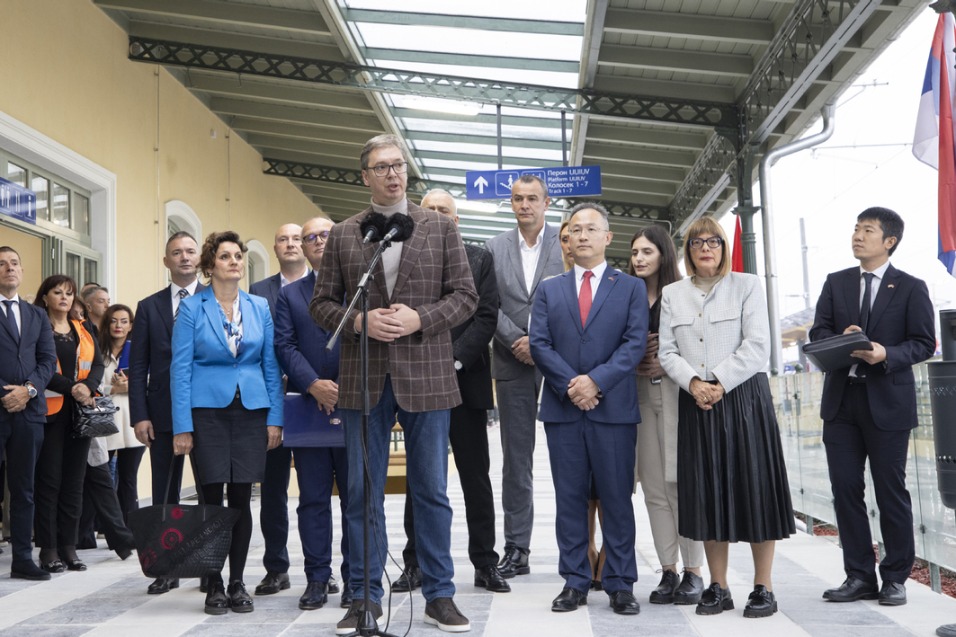Full text: Brazil-China Joint Statement on Combating Climate Change
Xinhua | Updated: 2023-04-16 10:00
BEIJING - China and Brazil on Saturday released a joint statement on combating climate change. The following is the full text:
Brazil-china joint statement on combating climate change
1. Presidents Xi Jinping and Luiz Inácio Lula da Silva met in Beijing on 14 April 2023. During their conversation, President Xi and President Lula recognized that climate change represents one of the greatest challenges of our time and that addressing this crisis contributes to building a shared future of equitable and common prosperity for humankind.
2. The international scientific community has shown unequivocally that human activity is changing the global climate system, and creating new challenges to sustainable development to developing countries. Developed countries bear the historical responsibility for greenhouse gas emissions, and should take the lead in scaling up climate actions by reaching climate neutrality earlier than 2050, providing climate finance, and respecting the right to development and the policy space of developing countries.
3. Brazil and China stress the need to combine urgent climate response with nature conservation to achieve Sustainable Development Goals (SDGs), including the eradication of poverty and hunger, while leaving no one behind.
4. Brazil and China commit to broadening, deepening and diversifying our bilateral cooperation in climate, as well as our joint efforts towards an enhanced global governance under the United Nations Framework Convention on Climate Change (UNFCCC), in accordance with equity and the principle of common but differentiated responsibilities and respective capabilities, in the light of different national circumstances, in the context of sustainable development, the inalienable Right to Development and efforts to eradicate poverty and hunger.
5. Under the UNFCCC, the Paris Agreement has given us a path to collectively hold the increase in the average global temperature to well below 2ºC above pre-industrial levels and to pursue efforts to limit the temperature increase to 1.5ºC above pre-industrial levels. We are determined to further strengthen multilateralism, including with all our partners within the Group of 77 and China (G77+China), with a view to a model of climate solidarity that is collective, that rejects unilateralism and green trade barriers, and that is firmly grounded on values of solidarity and cooperation in our international community.
6. We welcome the key political messaging from the COP27, in particular the need for means of implementation for developing countries at a time when the Paris Agreement is being implemented in accordance with the best available science and on the basis of equity and the principle of common but differentiated responsibilities and respective capabilities, in the light of different national circumstances.
7. Developing countries require predictable and adequate support from developed countries, including climate finance at the necessary and commensurable scope, scale and speed, as well as access to technology and markets to ensure and enable their sustainable development. Considering that the implementation of a just transition to a low carbon and climate-resilient economy in developing countries will cost trillions, as presented in the first Report on the determination of the needs of developing countries related to implementing the UNFCCC and its Paris Agreement, we continue to be very concerned that climate finance provided by developed countries continues to fall short of the USD 100 billion per year commitment, as it has every year since the goal was set in 2009, even as the actual amount needed far surpasses that commitment. We urge developed countries to honor their unfulfilled climate finance obligations, and to commit to their new collective quantified goal that goes well beyond the floor of USD 100 billion per year and provide a clear roadmap of doubling adaptation finance. Such provision of means of implementation for developing countries is the climate ambition the world needs in order to strengthen implementation of the UNFCCC and its Paris Agreement.
8. We are determined to contribute to a successful COP28 with the focus on implementation, in Dubai, later this year. As the main mechanism for promoting implementation and ambition on all aspects of the Paris Agreement under the UNFCCC, the Global Stocktake must be effective in assessing and identifying implementation gaps within the climate regime, whilst prospectively laying the foundations for developed countries taking the lead in emission reduction and fulfilling outstanding gaps in means of implementation for developing countries.
9. The outcomes of the Global Stocktake and the Intergovernmental Panel on Climate Change (IPCC)'s Sixth Assessment Report (AR6) will be important to inform countries in presenting their next round of nationally determined contributions (NDCs) to the Paris Agreement in 2025 in a nationally determined manner and taking into account different national circumstances, at COP30. China welcomes the Brazilian candidacy to host COP30, as the 2025 summit will be key to the very future of the global response to climate change.
10.We welcome the efforts of Brazilian and Chinese scientists to actively participate in the election of the AR7 IPCC Bureau and their dedication to the scientific assessments on global climate change.
11.We congratulate each other on and are determined to continue our respective ambitious domestic climate efforts and progress, and we commit to broadening, deepening and diversifying our bilateral cooperation on climate issues, in areas such as, transition to a sustainable and low carbon global economy; smart cities; green infrastructure; development of green industries; renewable energies, including access and support for isolated communities; electric mobility; innovation, research, and development of green technologies; and green finance and investment. We intend to engage collaboratively in support of eliminating global illegal logging and deforestation through effectively enforcing their respective laws on banning illegal imports and exports. We will further cooperate on developing and sharing technologies, including the new CBERS 6 satellite, which will enable enhanced monitoring of forest cover. Furthermore, we will promote the exchange of knowledge, best practices and other forms of cooperation for conservation and sustainable management of forests, regeneration and reforestation of degraded areas.
12.Brazil and China will promote policy dialogues and experience sharing on climate investment and finance.
13.Brazil and China decide to establish a Subcommittee on Environment and Climate Change under the China-Brazil High-level Coordination and Cooperation Committee (COSBAN).
14.President Lula thanked President Xi and the Chinese government for the warm welcome extended to the Brazilian delegation during his visit.
























